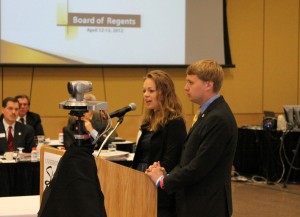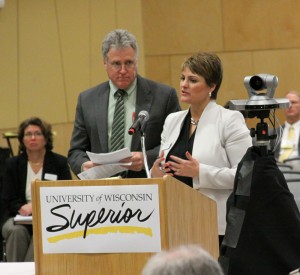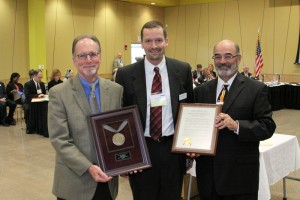SUPERIOR – As the University of Wisconsin System focuses more attention on the economic potential of research and development conducted by UW institutions, the Board of Regents heard several inspiring success stories at its Friday meeting.
At the inaugural meeting of the Research, Economic Development and Innovation (REDI) Committee, Maliyakal John, managing director of the WiSys Technology Foundation, told Regents that developing more partnerships between small companies and UW campuses will create an invaluable pipeline of technological expertise.
John told the Board that the foremost challenge currently facing WiSys is a lack of resources. Other challenges include the lack of an established R&D culture in the state, a lack of marketable product ideas, and full-time teaching loads that often preclude faculty members from research activities.
The state also has significant assets, John said. The UW System, for example, has 300-400 faculty members with significant technical expertise, while the state has several thousand small high-tech companies with product concepts.
John told the Board that WiSys’ impact includes $3 million in R&D funding brought to campuses between 2005 and 2011. Collaborations have also resulted in the creation of nine start-up companies, 56 discoveries, and 32 high-paying jobs.
As an example of the kind of high-tech research that campuses can generate, UW-Stout research specialist Kenneth Smith demonstrated for Regents a hydrogen fuel cell created and developed by his company, Cool Science, LLC. Smith expected that fuel cell to be commercialized in two to three years.
UW-Stout engineering student Destin Peters, who also has experience in materials science, said his involvement in the project “just seemed right for me.” He added, “It has really been beneficial to be able to see the entrepreneurial side of the business and product development.”
Senior chemistry majors Enkhtuul Tsogtbaatar and Katherine Anderson, both at UW-Eau Claire, spoke to Regents about their research work on new anticoagulant compounds, as part of efforts to improve the safety of warfarin use in humans.
“The research experience really helped us realize the joy and frustrations of our fellow science researchers,” Tsogtbaatar said. “It also taught me lessons: to be persistent and to have high standards of work ethics, all of which will benefit me when I get to grad school.”
Anderson added that collaborating with other scientists and attending national meetings allowed both students to see chemistry as it’s performed around the country and the world. “That gives me confidence and experience,” she said.
Both UW-Eau Claire students will pursue graduate studies at Ohio State University.
James Hamilton, a Wisconsin Distinguished Professor in Chemistry and Engineering Physics at UW-Platteville, spoke to Regents about the novel graphene technology being developed at his company, Xolve, LLC. He noted that American universities need to be more agile in their collaborations with businesses to be competitive.
Robinson Flaig, a chemistry major at UW-Platteville, is in his second year working with Xolve, and said the hands-on experience is invaluable. “You can go to class and learn things but doing research, I am learning how use instrumentation and how to be a team player in ways you couldn’t in the classroom,” Flaig said.
Regent Mark Bradley said the impressive presentations reinforce the intrinsic educational value of undergraduate students getting involved in research activities. He added that recognizing that value also challenges the traditional notions of what a “teaching university” and “research university” are and should be in the 21st century.
Regent David Walsh called the university’s role in generating valuable R&D “a non-partisan message we need to do a better job of sending.”
In other Committee business, UW System President Kevin P. Reilly reported that creation of a new position in UW System Administration to provide leadership for the economic development portfolio is underway. “The new position will be funded 50 percent by the Wisconsin Economic Development Corporation, reflecting a very strong University-State partnership that will help us address the needs of established industries, fledgling startups, and growing communities all across Wisconsin,” Reilly said.
Student representatives seek additional avenues for communicating with Board
Allie Gardner, chair of the Associated Students of Madison (ASM), and Dylan Jambrek, vice president and chair of the board of directors for the United Council of Students, appeared before the full Board to express their interest in developing additional avenues of communication between students and Regents.
“Let students advocate for students,” Jambrek said.
Among several requests, Gardner and Jambrek invited Regents to attend United Council meetings and to consider providing an open forum or other opportunity for public comment after Board meetings.
“It’s very clear students are more engaged in what’s going on in this room,” Gardner said. “For us to be able to add on ways we can communicate that engagement would be positive.”
Student Regent Troy Sherven pointed out that he and Katie Pointer, the other Student Regent, have attended student representative meetings and also host pre-Board meeting conference calls with student representatives to better represent their interests.
Gardner acknowledged the value of those interactions, but reiterated students’ interest in having more direct contact with Board members.
Regent Jeff Bartell told the students that his fellow Board members “are happy to communicate with anyone about the functioning of the Board of Regents,” and encouraged them to initiate further contacts.
Regent Bradley noted, however, that the Board represents a broad range of constituencies and it could be logistically challenging to provide all with open forums.
Student Regent Pointer encouraged Gardner and Jambrek, as well as other students, to consider the Student Regents as their “point person.”
NorthWERD to boost economic development
UW-Superior Chancellor Renée Wachter and Bob Meyer, President of Wisconsin Indianhead Technical College, led a presentation before the REDI Committee on the new Northwest Wisconsin Educators for Regional Development (NorthWERD) consortium.
Wachter said NorthWERD’s collaborative efforts will support other economic development agencies in the region, while helping to facilitate more seamless opportunities for educational attainment and career preparation.
NorthWERD’s membership includes UW-Superior, Northland College, Wisconsin Indianhead Technical College, Northcentral Technical College, UW-Barron County, Lac Courte Oreilles Ojibwa Community College, UW-Extension, Cooperative Education Service Agency #12. The consortium’s combined enrollment is 45,000 students at all levels.
President Reillys Report:
President Reilly provided an update on recent legislative activity. He noted that several bills related to higher education passed in recent weeks, including SB 461, which contains provisions on teacher preparation; AB 144, which creates a commission on financial aid; and AB 322, which facilitates making instructional materials more readily and more quickly available for students with disabilities.
President Reilly also provided news from around the UW System.
- See UW System news
Regent Presidents Report :
President Spector updated Regents on new Board members, noting that John Behling of Eau Claire and Regina Millner of Madison were appointed by the Governor to full seven-year terms and have been unanimously confirmed by the Senate. Earlier this week, the Governor appointed Tracy Hribar of Franksville, a student at UW-Parkside, as the new non-traditional Student Regent.
Discussion about UW-Platteville Res/Dining Facility
In approving a new residence hall and dining facility at UW-Platteville, the Regents noted the university’s use of an entrepreneurial public/private model to speed construction and reduce costs.
The UW-Platteville Real Estate Foundation will lease university-owned land and assume responsibility for construction of the new facility, which is needed to serve the growing number of students living on campus. Later, the Board of Regents will have the opportunity to purchase the building back. This model, reported Regent Jeff Bartell, will save about $6 million, and those savings will be passed along to students.
Regent Michael Falbo asked about the development fee, to be paid to the UW-Platteville real estate foundation from funds secured through state bonding authority. UW System Associate Vice President David Miller pointed out that this is consistent with standard practice, in which all construction costs are paid through state bonds, including the 4% development fee typically paid to the State’s Department of Administration. The UW-Platteville real estate foundation’s development fee, by comparison, is significantly less.
Regents get update on Task Force
Regent Michael Falbo, who chairs the Legislative Task Force on UW Restructuring and Operational Flexibilities, provided an update on the group’s most recent meeting on April 10. The agenda at that meeting included presentations on capital construction and purchasing, and continued discussion about previous presentations on governance structures and advisory boards.
Falbo said that the Task Force members were impressed with the well-thought out, constructive presentations and specific recommendations for change offered by UW staff. However, he said that members of the Task Force were somewhat disappointed with the responses from Department of Administration (DOA) staff.
“We got very little back from the DOA in the form of specific suggestions,” said Falbo. “They said everything’s fine, but I don’t think that any member of the Task Force believed that.”
With respect to ongoing deliberations about governance structures and the roles of local advisory boards, Falbo reported that the Task Force is still weighing the pros and cons of many suggestions. While the group’s members generally agree that more authority be pushed out to the institutions, the focus remains on relieving UW campuses from burdensome state regulation.
Regent Tim Higgins noted that several members of the Task Force have not yet weighed in on this issue of governance structures.
“We’re waiting for a full discussion of this topic, so it’s too early to catch the drift of the Task Force as a whole,” said Higgins.
Board recognizes Student Regent Sherven’s service
Introducing a resolution of appreciation for Student Regent Troy Sherven, whose term of service is ending, Regent Mike Falbo saluted Sherven him for providing “a new and significant voice” to Board discussions, also noting that Sherven is the first on the board to be enrolled in an online degree program.
Falbo added that getting to know Sherven gave him “comfort and confidence that our future is in good hands.”
Sherven thanked Gov. Scott Walker for the opportunity to serve as a Regent and said, “I can’t think of a better way to top off a management degree.”
Acknowledging the many challenges facing higher education and the state, Sherven said he is encouraged about the future of the UW System when he thinks of the men and women leading it.
In other business, the Board:
- Approved a resolution of appreciation recognizing UW-Superior as host of the April 2012 meetings;
- Approved revisions to update Chapter I of the Bylaws of the Board of Regents;
- Approved three proposed baccalaureate degree programs: the Bachelor of Business Administration/Bachelor of Science/Bachelor of Arts in Interactive Web Management at UW-Oshkosh; the Bachelor of Fine Arts in Interior Design at UW-Stout; and the Bachelor of Fine Arts in Industrial Design at UW-Stout;
- Approved the proposed Ph.D. in Public Health at UW-Milwaukee, which has a concentration in Community and Behavioral Health Promotion;
- Approved the 2012-13 request to the Trustees of the William F. Vilas Trust Estate in support of scholarships, fellowships, professorships and special programs in arts and humanities, social sciences, and music at UW-Madison and UW-Milwaukee;
- Approved an extension of the scheduled five-year review of a number of previously approved differential tuitions until February 2013 to avoid any potential conflicts with Act 32 language which prohibits any new tuition increases during this biennium, including differentials, beyond the stated 5.5% cap;
- Approved UW-Madison’s four-year data analysis agreement with Pfizer, Inc.;
- Approved UW-La Crosse’s seven-year contract for dining services with Sodexo Operations, effective July 1, 2012;
- Approved the 2012 non-routine shareholder proxy proposals; the dominant social issues for 2012 include corporate political contributions and lobbying, the environment and “sustainability,” equal employment opportunity, and animal welfare;
- Approved UW-Madison’s request for authority to construct the $2.3M gift-funded All-Seasons Softball Practice Facility Project;
- Approved UW-Madison’s request for authority to accept a gift of 25 acres of land in the Town of Middleton south of the current boundary for the future expansion of University Research Park II;
- Approved UW-Madison’s request for authority to increase the project scope and budget and to construct the third and final phase of the Student Athlete Performance Center project at an estimated cost of $33.3M Gift Funds. The Student Athlete Performance Center project remodels existing space within the McClain Center and Camp Randall Stadium and constructs an addition on the north end of Camp Randall;
- Approved UW-Madison’s request for authority to grant a permanent easement 367.5 feet long and 27 feet wide along Oxford Road in the Village of Shorewood Hills for the purpose of road construction and improvement purposes;
- Approved UW-Milwaukee’s request for authority to lease space for the School of Freshwater Sciences and the College of Engineering and Applied Sciences;
- Approved UW-Milwaukee’s request for authority to request the release of enumerated funds to purchase the Joseph J. Zilber School of Public Health building using $12M Program Revenue Supported Borrowing;
- Approved the allocation of the 2011-13 Classroom Renovation/Instructional Technology Improvement funds and grant authority to construct various Classroom Renovation/IT projects to provide appropriate environments to support contemporary learning and teaching methodologies; and
- Approved UW System’s request for three All Agency Maintenance and Repair projects on three campuses totaling about $2.7M. These requests include exterior upgrades, elevator renovations, and code compliance concerns.
###
The UW System Board of Regents will hold its next meeting June 7-8, 2012, at UW-Milwaukee
Photo Credit: Al Miller, UW-Superior
Related: Read April 12 (day 1) news summary



